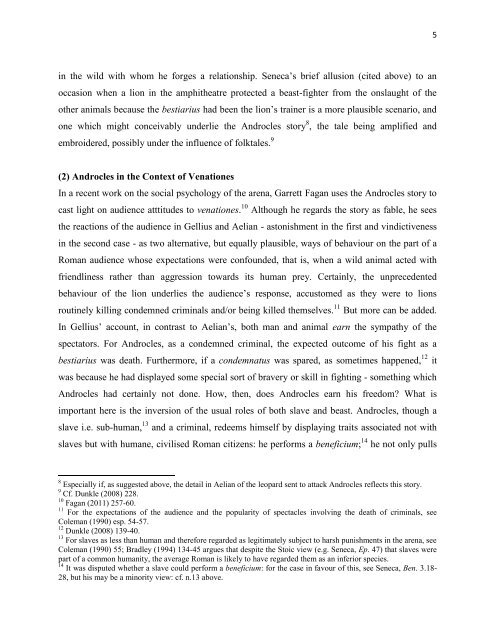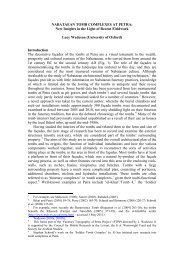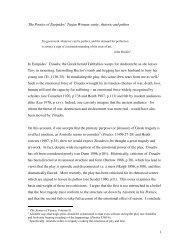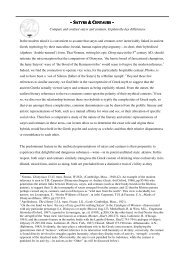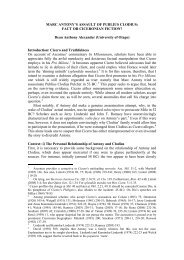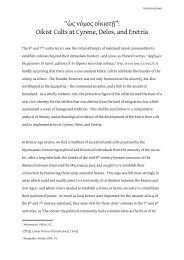'Reality, Paradox and Storytelling in Aulus Gellius' Narrative of ...
'Reality, Paradox and Storytelling in Aulus Gellius' Narrative of ...
'Reality, Paradox and Storytelling in Aulus Gellius' Narrative of ...
You also want an ePaper? Increase the reach of your titles
YUMPU automatically turns print PDFs into web optimized ePapers that Google loves.
5<br />
<strong>in</strong> the wild with whom he forges a relationship. Seneca’s brief allusion (cited above) to an<br />
occasion when a lion <strong>in</strong> the amphitheatre protected a beast-fighter from the onslaught <strong>of</strong> the<br />
other animals because the bestiarius had been the lion’s tra<strong>in</strong>er is a more plausible scenario, <strong>and</strong><br />
one which might conceivably underlie the Androcles story 8 , the tale be<strong>in</strong>g amplified <strong>and</strong><br />
embroidered, possibly under the <strong>in</strong>fluence <strong>of</strong> folktales. 9<br />
(2) Androcles <strong>in</strong> the Context <strong>of</strong> Venationes<br />
In a recent work on the social psychology <strong>of</strong> the arena, Garrett Fagan uses the Androcles story to<br />
cast light on audience atttitudes to venationes. 10 Although he regards the story as fable, he sees<br />
the reactions <strong>of</strong> the audience <strong>in</strong> Gellius <strong>and</strong> Aelian - astonishment <strong>in</strong> the first <strong>and</strong> v<strong>in</strong>dictiveness<br />
<strong>in</strong> the second case - as two alternative, but equally plausible, ways <strong>of</strong> behaviour on the part <strong>of</strong> a<br />
Roman audience whose expectations were confounded, that is, when a wild animal acted with<br />
friendl<strong>in</strong>ess rather than aggression towards its human prey. Certa<strong>in</strong>ly, the unprecedented<br />
behaviour <strong>of</strong> the lion underlies the audience’s response, accustomed as they were to lions<br />
rout<strong>in</strong>ely kill<strong>in</strong>g condemned crim<strong>in</strong>als <strong>and</strong>/or be<strong>in</strong>g killed themselves. 11 But more can be added.<br />
In Gellius’ account, <strong>in</strong> contrast to Aelian’s, both man <strong>and</strong> animal earn the sympathy <strong>of</strong> the<br />
spectators. For Androcles, as a condemned crim<strong>in</strong>al, the expected outcome <strong>of</strong> his fight as a<br />
bestiarius was death. Furthermore, if a condemnatus was spared, as sometimes happened, 12 it<br />
was because he had displayed some special sort <strong>of</strong> bravery or skill <strong>in</strong> fight<strong>in</strong>g - someth<strong>in</strong>g which<br />
Androcles had certa<strong>in</strong>ly not done. How, then, does Androcles earn his freedom What is<br />
important here is the <strong>in</strong>version <strong>of</strong> the usual roles <strong>of</strong> both slave <strong>and</strong> beast. Androcles, though a<br />
slave i.e. sub-human, 13 <strong>and</strong> a crim<strong>in</strong>al, redeems himself by display<strong>in</strong>g traits associated not with<br />
slaves but with humane, civilised Roman citizens: he performs a beneficium; 14 he not only pulls<br />
8 Especially if, as suggested above, the detail <strong>in</strong> Aelian <strong>of</strong> the leopard sent to attack Androcles reflects this story.<br />
9 Cf. Dunkle (2008) 228.<br />
10 Fagan (2011) 257-60.<br />
11 For the expectations <strong>of</strong> the audience <strong>and</strong> the popularity <strong>of</strong> spectacles <strong>in</strong>volv<strong>in</strong>g the death <strong>of</strong> crim<strong>in</strong>als, see<br />
Coleman (1990) esp. 54-57.<br />
12 Dunkle (2008) 139-40.<br />
13 For slaves as less than human <strong>and</strong> therefore regarded as legitimately subject to harsh punishments <strong>in</strong> the arena, see<br />
Coleman (1990) 55; Bradley (1994) 134-45 argues that despite the Stoic view (e.g. Seneca, Ep. 47) that slaves were<br />
part <strong>of</strong> a common humanity, the average Roman is likely to have regarded them as an <strong>in</strong>ferior species.<br />
14 It was disputed whether a slave could perform a beneficium: for the case <strong>in</strong> favour <strong>of</strong> this, see Seneca, Ben. 3.18-<br />
28, but his may be a m<strong>in</strong>ority view: cf. n.13 above.


